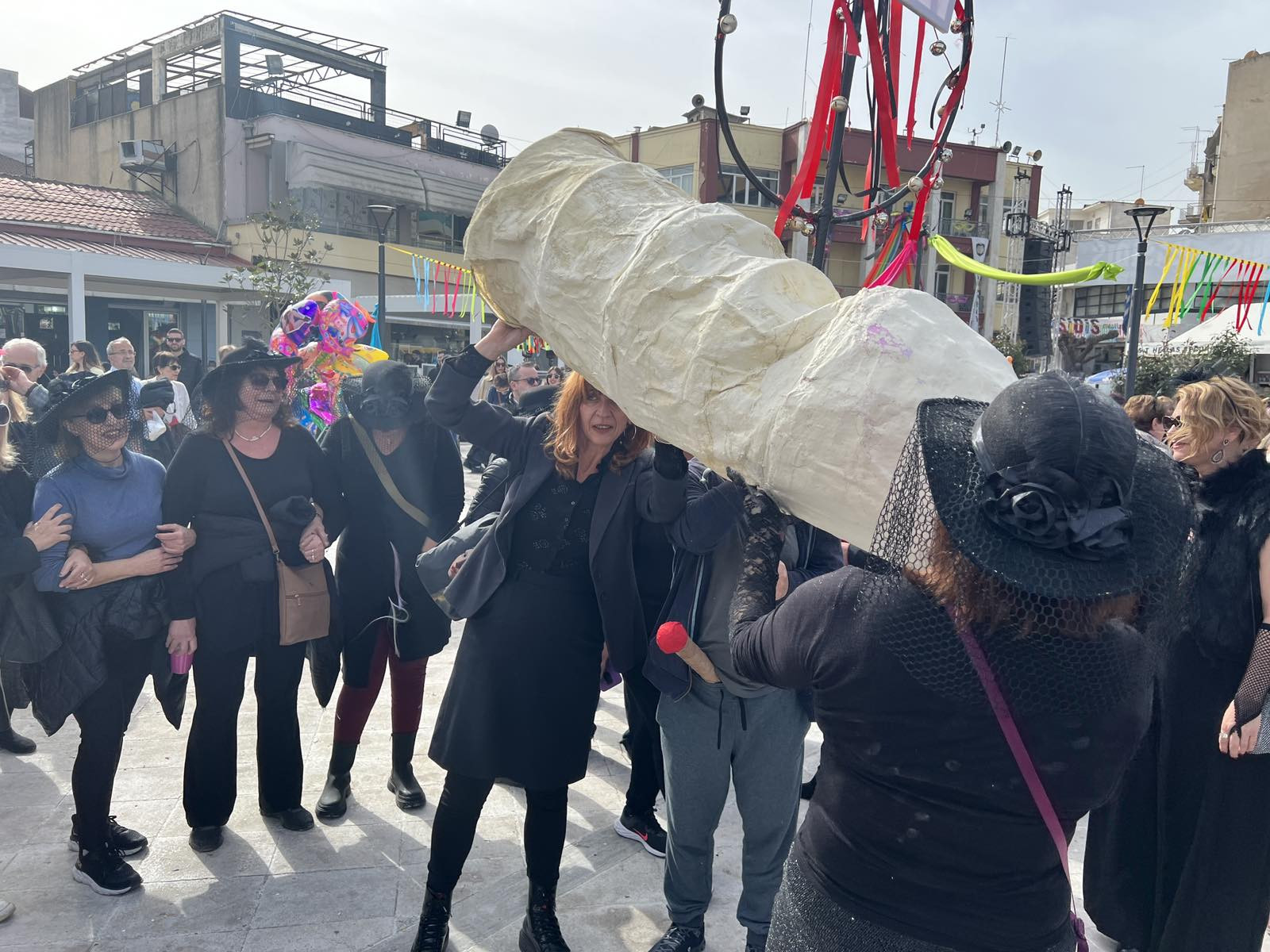“Bourani” in Tyrnavos closes the cycle of Carnival events every year. At this carnival anything can happen…
Huge phalluses fill the city.
Tsipouro and wine flow abundantly. In Tyrnavos, no pin falls. Anyone with taboos better stay away
At this carnival anything can happen…
“Bourani” in Tyrnavos closes the cycle of Carnival events every year.
A Turkish word meaning cabbage rice or spinach rice and had a special way of preparation
from the Buranites.
But how did this tradition begin?
Its roots are lost in time, but the first evidence of the practice of the custom appears in 1898. There are two versions of the origin of the custom. The first mentions that its roots are found in ancient times and in festivals such as Dionysia, Aphrodisia and Thesmoforia. Back then, booze flowed profusely and “indecent” acts and dalliances were glorified during the Bacchic rites.
The second version states that the custom was established by Arvanites when they were settled, by the Sultan, in Tyrnavos, around 1770, and it still maintains parts of the form it had then.
Every year, on Clean Monday in Tyrnavos, the people of Tyrnavos go to the chapel of the Prophet Ilias, in the form of a procession, spread various foods and a phallus-shaped bottle of wine on the ground.
During the Turkish rule, the “winner” (the one who got drunk the most) was “crowned” by the residents, “King of Halloween”.
The “King”, again according to two versions, was either carried around on the shoulders of the inhabitants, in the square, and “washed” with decorative epithets and gestures, or they put him upside down on a donkey and carried him around the city while he held his tail donkey.
Of course, with the passage of time and conservative governments and church influences, the carnival was attacked and censored. After all, the central motif of the Tyrnavitis carnival was and remains the phallus. Huge penises, in different colors, either made of clay or made of plastic, star in the celebrations. As much as the respective governments and the church tried to censor the festival, the residents reacted and continued the celebrations even in secret. After the dictatorship period, the residents added the parade of large floats, with themes inspired by traditions as well as current events.
All events culminate on the last Sunday of Halloween.
As the historian Achilleas Tzarzanos reports:
In the past, the event of “Mpouravi” was more genuine, more comprehensive and of course more shameless. It was not done in the Prophet Elias but in every neighborhood and in every square where the laborers lit a fire and made the burani. The ingredients are spinach, rice, nettle and a bit of anterakos together with vinegar for deliciousness without any oil.
Around the fire, they danced and teased each other and hurled profanities. They made obscene gestures and indiscriminate gestures towards male passers-by. Of course, there was no shortage of clay, wooden and carrot phalluses. They also sang obscene songs such that if one heard them written one could get an idea of what the phallic and other similar chants of the ancient Greeks were.
There is a record of the custom by the French traveler Leon Heze around 1858 who talks about the King who was proclaimed by the Buranites and was the drunkest.
Representation of a chariot with the phallus on top, also found on an ancient vessel. Another inscribed effigy of a 47 cm long marble phallus is preserved in the Archaeological Museum of Larissa._mg_2506
Today the inhabitants of the city go to the chapel of the Prophet Elias in the north of the city, in a large open space.
The march takes place in a procession, which is preceded by various groups (troupes) disguised or not (only men), who carry all the necessary for the liturgy.
When they arrive at the place of Prophet Elias, each group lays on the ground various foods and a large bottle in the shape of a “phallus” filled with wine or a mixture of ouzo or tsipouro with water. At the same time, they light a fire on which they prepare “Bourani”, a vegetable soup made of spinach and vinegar to taste.
After the Burani, which was in the form of a soup, is made, it is served to the “meeters” as methexis -participation in the events- and thus the signal is given to start dancing and singing, joking and teasing with obscene basic expressions.
Many of the men participating in this ritual hold phalluses in their hands like sceptres.
In the past strictly only men took part in this custom while women stayed away, perhaps for reasons of modesty due to the alleged phallic symbols.
Women and children, however, watched the events as well as crowds of visitors from various parts of Greece.
When the “Burani” was finished boiling, everyone went to the banks of the Titarissios and there they ate and drank, following the obscene teasing and singing.
Carnet devoyage
Source :Skai
I am Frederick Tuttle, who works in 247 News Agency as an author and mostly cover entertainment news. I have worked in this industry for 10 years and have gained a lot of experience. I am a very hard worker and always strive to get the best out of my work. I am also very passionate about my work and always try to keep up with the latest news and trends.











